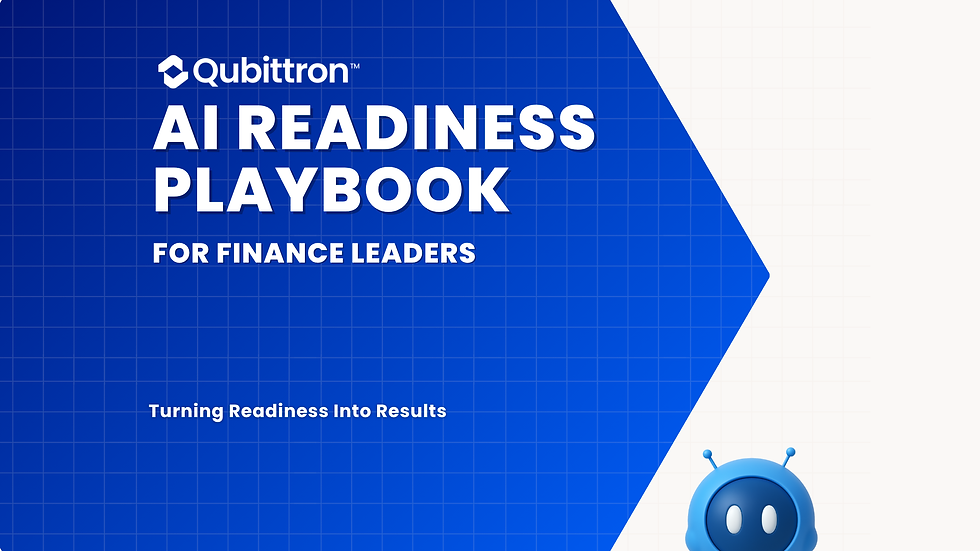Navigating the ERP Selection Journey: A Guide for Senior Leaders
- Qubittron

- Aug 8, 2024
- 3 min read
Navigating the ERP Selection Journey: A Guide for Senior Leaders
Selecting a new Enterprise Resource Planning (ERP) system is a critical decision that can have a profound impact on your organization's operations, growth, and competitiveness. As a senior leader, it is crucial to approach this process with thorough research and careful consideration. In this blog post, we will outline the key steps senior leaders should take to choose the right ERP system for their respective organizations. Additionally, we will shed light on the risks associated with this process to help you mitigate potential pitfalls.
Assess Organizational Needs: Begin by conducting a comprehensive assessment of your organization's current and future needs. Engage stakeholders across departments to identify pain points, inefficiencies, and areas for improvement. This analysis should include an evaluation of scalability requirements, integration capabilities, specific industry needs, and compliance considerations.
Define Objectives and Requirements: Clearly define your organization's objectives for implementing a new ERP system. Establish a set of key requirements that the system must fulfill, such as financial management, supply chain optimization, or customer relationship management. Prioritize these requirements based on their impact on your business and use them as a guiding framework during the selection process.
Research and Shortlist ERP Providers: Conduct thorough research to identify ERP providers that align with your organization's industry, size, and requirements. Evaluate their track record, customer reviews, industry expertise, and support services. Create a shortlist of potential ERP vendors that demonstrate a strong fit with your organization's needs.
Request Proposals and Conduct Demonstrations: Reach out to the shortlisted ERP vendors and request detailed proposals that outline their solutions, implementation process, timeline, and associated costs. Schedule live demonstrations to witness the system's capabilities firsthand. These demonstrations should be tailored to your organization's specific needs and include scenarios that reflect your business processes.
Perform Due Diligence: Perform due diligence by conducting reference checks and engaging with existing customers of the shortlisted ERP vendors. Seek insights into their experience with the vendor, system functionality, support services, and overall satisfaction. This step provides valuable firsthand information that helps validate vendor claims and ensures a reliable partnership.
Evaluate Total Cost of Ownership (TCO): Beyond the initial investment, consider the long-term financial implications of implementing an ERP system. Evaluate the total cost of ownership (TCO) by factoring in licensing fees, implementation costs, ongoing maintenance, upgrades, and training expenses. Understanding the TCO enables you to make an informed decision and avoid unexpected financial burdens.
Risks Associated with the ERP Selection Process:
Inadequate Planning: Insufficient planning can lead to misalignment with organizational needs and objectives, resulting in suboptimal system selection.
Integration Challenges: Integrating a new ERP system with existing systems and processes can be complex, potentially causing disruptions if not planned and executed properly.
Incomplete Vendor Assessment: Failing to conduct a thorough evaluation of ERP vendors can lead to partnering with a provider that may not meet your organization's long-term needs or lacks adequate support.
Overlooking Change Management: Inadequate attention to change management can impede user adoption and hinder successful implementation.
Selecting the right ERP system requires a diligent and meticulous approach from senior leaders. By following the outlined steps and understanding the associated risks, you can minimize uncertainties and increase the chances of a successful ERP implementation. Remember, an ERP system should align with your organization's specific needs, support its growth objectives, and provide a solid foundation for digital transformation. At Qubittron, we stand ready to assist you in navigating this complex journey, ensuring that you choose an ERP solution that drives your organization's success in the years to come.




Comments